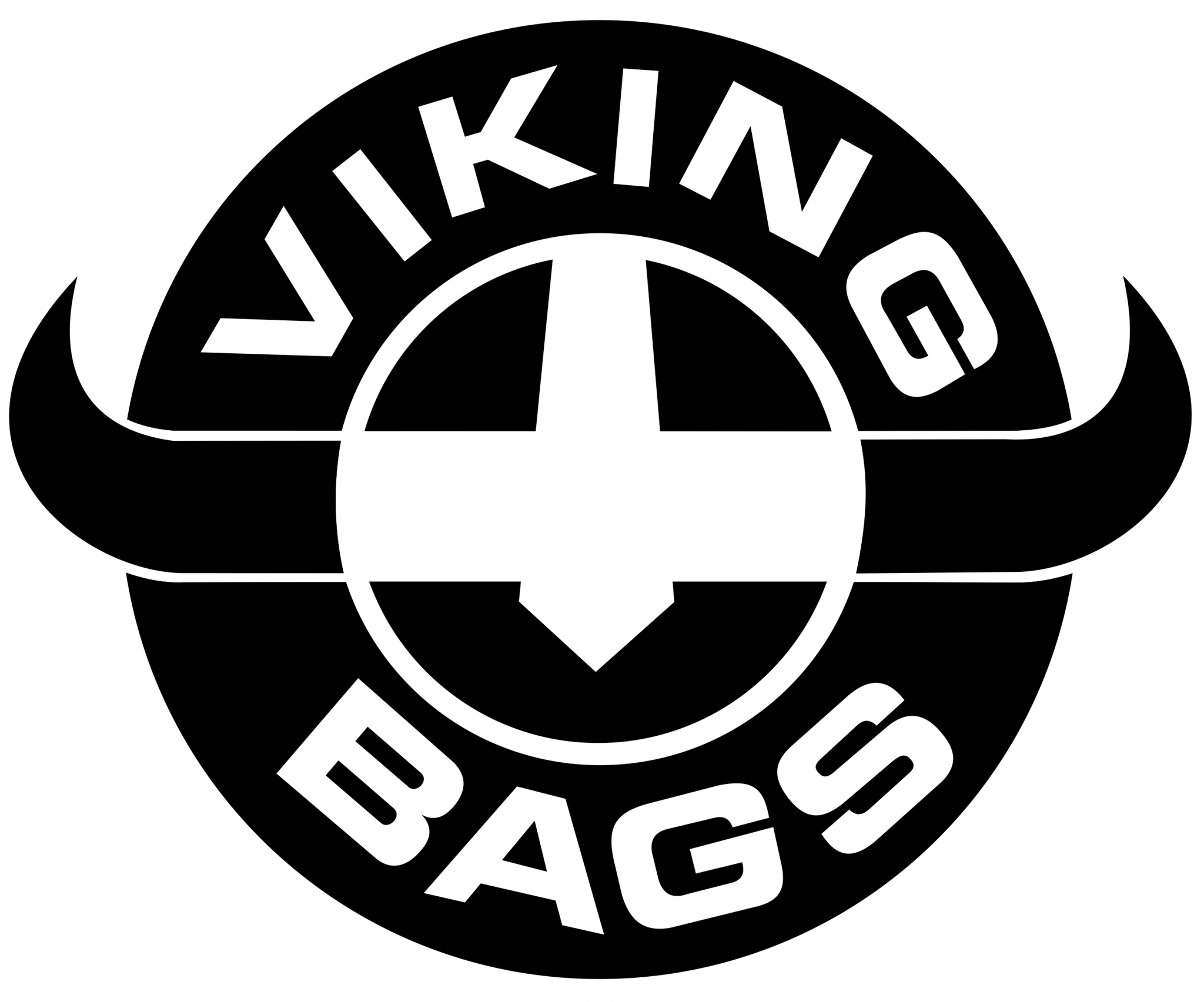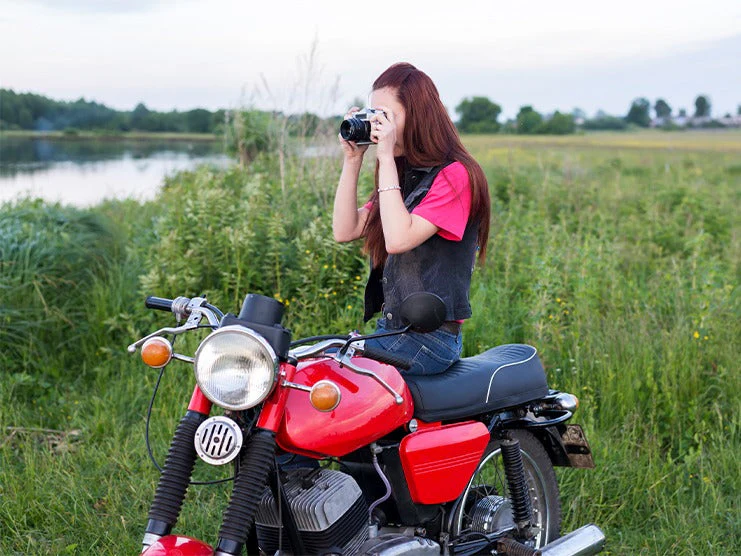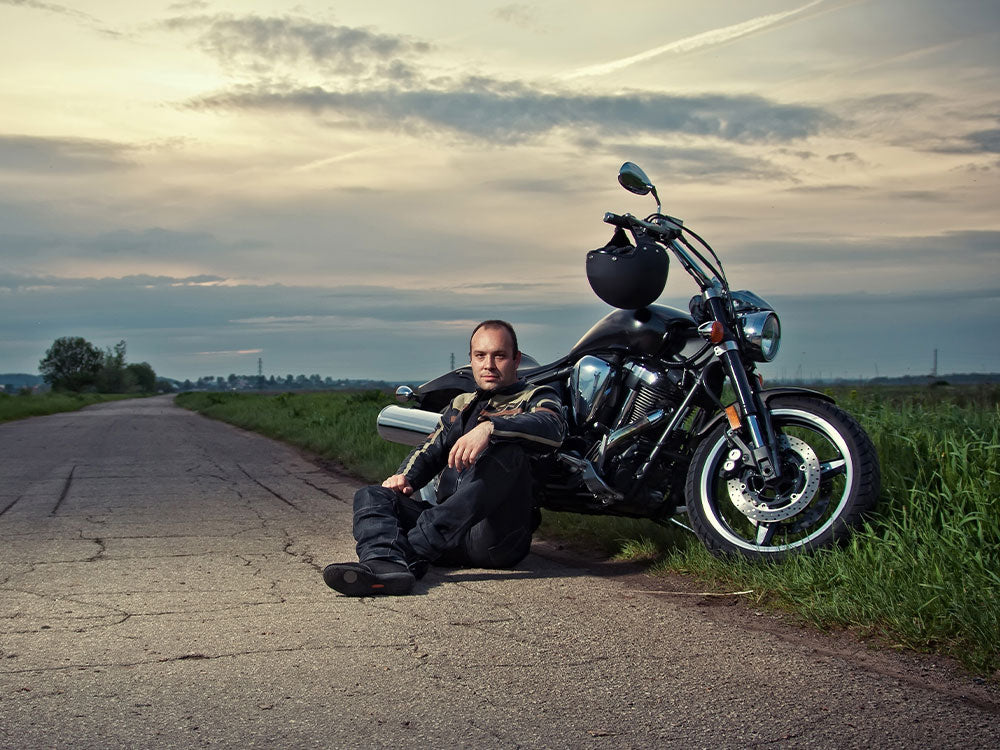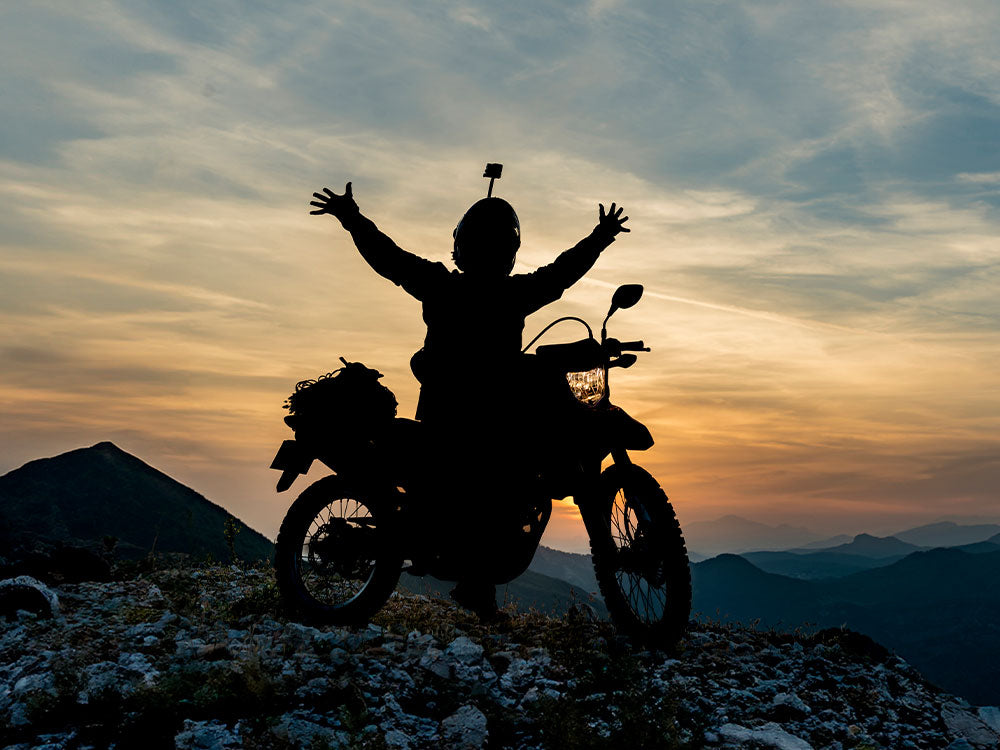Taking pictures of motorcycles while touring is a popular hobby among riders. However, taking great photos of motorcycles requires a lot of skill.
This article discusses the right camera, lighting, location, angle, focus, and other information required to take amazing motorcycle photos.
Table of Content

1. Equipment
To take good motorcycle photos, you need the right camera. Cell phone cameras can take great static motorcycle photos and are easy to carry. But they lack certain features other cameras have, including focus settings, adjustable zoom, and viewfinder.
To take good motorcycle photos, you need to be able to take high-speed shoots. Many budget-friendly cameras have decent SLR (single-lens reflex) and medium optical zoom to better capture fast-moving objects. To get a clearer and sharper image, get a camera including an SLR with a fast drive mode.
For beginners, get a Canon 5D, 7D, or beginner-level DSLR since they have almost all the required features to take stunning motorcycle photos.
Make sure your camera has lenses that can zoom between the ranges of 17-50 mm and 70-300 mm. A 300 mm lens is best if you want to take pictures of motorcycles from long distances.
2. Lighting
Make sure the light is reflecting off your motorcycle equally. Try to avoid intense lighting, such as direct sunlight which can cast shadows and result in high contrast.
High contrast and shadows aren't always a bad thing. If you're a skilled photographer, you can use them for dramatic effects. However, intense lighting is not ideal when taking photographs you want to use to try and advertise a motorbike.
A clean motorcycle and a beautiful location will not improve your photos if the lighting isn't ideal. Learning how to use appropriate lighting in your motorcycle photos can be a challenging task, requiring careful inspection and a lot of patience. Early in the morning and just before sunset is the best times to take pictures.
You can get bright but diffused light by using the following methods:
- Cover/Shade: Position your motorbike underneath a garage door, shade from a tree, Or within a building's shadow.
- Clouds: Take a picture of when the sun is hidden behind clouds.
- Dusk/Dawn: Take photos of a motorcycle in the early morning or around sunset.
3. Background
Different backdrops will go well with certain motorcycles. A modern vintage bike might look great in an urban environment. Harsh, blocky, and foreboding architecture can also better capture the essence of a superbike.
Generally, a background free of distractions works best, such as a field, a wall, metal shutters, or an empty road.
4. Angle
Angles can change your perspective of the same scene, providing a different look that could improve your pictures.
For photos that look natural, it is best to take photos at eye level. But for lavish motorcycle photos, take pictures from high and low angles. Low angle is more often used for motorcycle photography, getting down to the ground and pointing the lens upward to capture the motorcycle works so well.
Here are examples of images taken of the same location but from different angles:
Above Shoot: Looks dull and has large shadows

Below Shoot: Looks more appealing

5. Focus
With most digital cameras, you can lock focus on the main subject, whether a bike or something else, after you make sure the set is clear of distractions. Then, you can recompose the shot while pressing the shutter button halfway. Once you've achieved the desired effect, softly press the shutter button to prevent the camera from moving.
To avoid blurry pictures, use a shutter speed that is fast enough to ensure your pictures are clear. A decent rule of thumb is to utilize shutter speeds that are at least twice as fast as the lens's focal length when photographing static subjects unless you're using a tripod or your camera has image stabilization.
6. Use a Tripod
Getting your camera into the ideal position to capture the perfect image you want might be difficult due to wind, moving cars, and other distractions. By using a tripod, you can affix your camera securely in place and can easily make slight adjustments until you are ready to press the shutter release.
It is best to photograph motorcycles close to the ground. It gives them a bigger appearance, offers a unique point of view, and improves the image if there is a unique background. Rather than crawl around on your hands and knees, use a tripod instead.
7. Panning
Panning is when you follow and take pictures of a bike in motion. This can be fairly challenging to master, especially with a large zoom lens since you will need to practice repeatedly to perfect this technique.
8. Shutter Speed
When taking pictures of moving motorbikes, you may need to experiment with different shutter speeds.
If your camera has the option, put it in shutter priority mode. Start with a shutter speed of 1/500 or 1/1000 depending on how quickly and how far away the motorcycle is moving.
The quicker the shutter speed, the brighter the flash must be. The more pictures you take, the faster the shutter speed must be.
When taking pictures of a moving motorbike, you have two options: hold the camera steady while you snap the picture to capture an instant, or blur the backdrop by following the motorcycle through the viewfinder. You'll discover what works best for you after undergoing a little trial and error.
9. Camera Setting
Even little adjustments to camera settings might provide significantly different outcomes.
For the novice, a wide aperture with a shutter speed of 1/1000 second can produce reasonably clean images. However, there won't be much of a speed impact when employing this stop-motion approach.
Experiment with motion blur to give a picture a greater sense of speed. But don't use this setting too much or you risk obscuring the main subject.
10. Framing

Depending on the motorcycle, you will have to take different approaches when it comes to framing. Look at which parts of your motorcycle you want to capture. You can take a front shot, a side shot, or a close-up that focuses on a particular area.
Keep the horizon lines low and away from the motorcycle part, you want to photograph. Get on your knees or use a tripod and point your camera upward to take a photo of a motorcycle against the sky. But do not bring your camera too close or it will cause the image to go out of focus.
11. Keep the Motorcycle Upright
It is essential to keep your motorcycle in an upright position. An upright motorcycle is best when capturing left-side photos. When motorcycles are on the side stand, they can lean over easily and that will obstruct your photography.
Here are three ways to keep your bike upright:
- Place a thick wooden piece (3 cm-3.5 cm) under the side stand’s foot
- Use a center stand
- Use a track stand to secure the rear wheel’s position
Most motorcycles don’t have a center stand, instead coming with a track stand instead. The best option is to put a wooden wedge under the side stand.
Carry a small piece of wood in your storage bag if you want to take more fascinating pictures of your motorcycles. This will allow your motorcycle to get a more upright position as shown in the picture below.

12. Use of Light
Try to make use of exterior lights and lighting equipment. Most photographers set up lights in a photography studio. Though light stands are best, you can make use of flashlights, a garage light, or desk lamps.
In addition to exterior lights, turning on a motorcycle's headlight can also make a huge difference. Your motorcycle will look brighter in pictures with the headlight on. The picture below shows a Ducati 1098S with both of its headlights on

13. Last Words
Taking pictures of motorcycles is a fun activity that almost every rider enjoys. You can improve your photography skills by knowing the right angles, choosing an appropriate background, getting a suitable camera, and following the other tips discussed in this article. If you are facing motorcycle storage issues then you should consider getting motorcycle luggage like saddlebags, tank bags, sissy bar bags, and backpacks.













Leave a comment
All comments are moderated before being published.
This site is protected by hCaptcha and the hCaptcha Privacy Policy and Terms of Service apply.